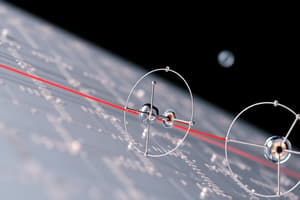Podcast
Questions and Answers
What is a watt?
What is a watt?
- A unit of force
- A measure of temperature
- The power of a device to convert 1 joule of energy from one form to another in 1 second (correct)
- The energy required to move an object
What is the rate of doing work referred to as?
What is the rate of doing work referred to as?
Power
What is power in terms of energy?
What is power in terms of energy?
It is the rate of transfer of energy.
What does a quicker response measure in thermometry?
What does a quicker response measure in thermometry?
What does sensitivity in thermometry measure?
What does sensitivity in thermometry measure?
What does linearity in thermometry refer to?
What does linearity in thermometry refer to?
What is range in thermometry?
What is range in thermometry?
What is conduction?
What is conduction?
What is convection?
What is convection?
What is radiation?
What is radiation?
What is evaporation?
What is evaporation?
What does Boyle's Law state?
What does Boyle's Law state?
What is heat capacity?
What is heat capacity?
What is specific heat capacity?
What is specific heat capacity?
What is melting?
What is melting?
What is boiling?
What is boiling?
What is solidification?
What is solidification?
What is condensation?
What is condensation?
What is specific latent heat of fusion?
What is specific latent heat of fusion?
What is specific latent heat of vaporisation?
What is specific latent heat of vaporisation?
What does the pressure law state?
What does the pressure law state?
What is a physical quantity?
What is a physical quantity?
What is a scalar quantity?
What is a scalar quantity?
What is a vector quantity?
What is a vector quantity?
What is displacement?
What is displacement?
What is speed?
What is speed?
What is velocity?
What is velocity?
What is acceleration?
What is acceleration?
What is a gravitational field?
What is a gravitational field?
What is gravitational field strength?
What is gravitational field strength?
What is weight?
What is weight?
What is mass?
What is mass?
What is density?
What is density?
What does Newton's 3rd law of motion state?
What does Newton's 3rd law of motion state?
What is terminal velocity?
What is terminal velocity?
What is thinking distance?
What is thinking distance?
Flashcards are hidden until you start studying
Study Notes
Power and Energy
- Watt: Defined as the power to convert 1 joule of energy per second.
- Power: Refers to the rate of doing work or the rate of energy transfer.
Thermometry Concepts
- Quicker Response: Measures how fast a thermometer registers temperature changes.
- Sensitivity: Indicates the change in a thermometric property in response to temperature variations.
- Linearity: Ensures equal thermometric changes correspond to equal temperature rises.
- Range: Denotes the minimum and maximum temperatures measurable by a thermometer.
Heat Transfer Mechanisms
- Conduction: Heat transfer through matter without overall movement of the material.
- Convection: Heat transfer in fluids caused by the movement of the fluid itself.
- Radiation: Heat transfer via electromagnetic waves.
Phase Changes and Latent Heat
- Evaporation: Liquid molecules escaping from the surface due to sufficient energy overcoming intermolecular attractive forces.
- Melting: Solid to liquid phase change occurring at constant temperature.
- Boiling: Liquid to gas phase change occurring at constant temperature.
- Solidification: Liquid to solid phase transition at constant temperature.
- Condensation: Gas to liquid phase change occurring without temperature change.
- Specific Latent Heat of Fusion: Heat needed to change unit mass from solid to liquid at constant temperature.
- Specific Latent Heat of Vaporisation: Heat needed to change unit mass from liquid to gas at constant temperature.
Gas Laws and Physical Quantities
- Boyle's Law: Pressure inversely proportional to volume for a fixed mass of gas at constant temperature.
- Pressure Law: Pressure directly proportional to absolute temperature for fixed mass at constant volume.
Quality of Measurements
- Physical Quantity: Any measurable quantity.
- Scalar Quantity: Described fully by magnitude and unit alone.
- Vector Quantity: Described by magnitude, unit, and direction.
Motion and Forces
- Displacement: Distance measured from a fixed point.
- Speed: Distance traveled per unit of time.
- Velocity: Rate of change of displacement.
- Acceleration: Rate of change of velocity.
- Gravitational Field: Area in space where gravitational forces act on bodies.
- Gravitational Field Strength: Gravitational force per unit mass at a point.
- Weight: Gravitational force acting on an object.
- Mass: Amount of substance in a body, independent of gravity.
- Density: Mass per unit volume of a substance.
Newton's Laws and Motion
- Newton's 3rd Law of Motion: For every action, there is an equal and opposite reaction between two bodies.
- Terminal Velocity: Constant velocity reached by a falling object when air resistance equals its weight.
- Thinking Distance: Distance a car travels from seeing a hazard to the driver applying brakes.
Studying That Suits You
Use AI to generate personalized quizzes and flashcards to suit your learning preferences.




